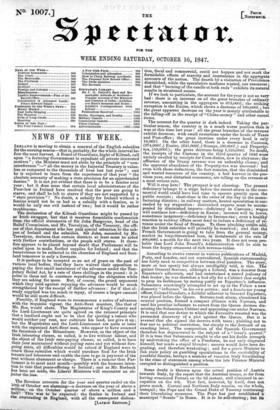According to stories current in various publications of Madrid, Paris,
and London, and not contradicted, Spanish statesmanship has fairly sunk to competition between rival panders. The story, more or less openly but always intelligibly told, is this. The galant General Serrano, although a Liberal, was a deserter from Espartero's adherents, and had entertained a rooted jealousy of that leader ; he was therefore a bad ally for a Cabinet that sought to prop its feebleness by resting partly on Espartero's influence. Salamanca accordingly attempted to set up in the Palace a new domestic "influence " in his own service; and a handsome young officer, Colonel Gandara a faithful adherent to General Espartero, was placed before the dueen. Serrano took alarm, abandoned his neutral position, forthed a compact alliance with Nareaez, and used his peculiar influence to extort from the Queen decrees dis- missing the Salamanca Cabinet and appointing one under Narvaez. It is said that one device to which the Favourite resorted was the pretended discovery of a plot against the Queen. But it is averred that she signed the decrees with tears; yielding not to fear nor to political conviction, but simply to t1L demand of an exacting lover. The composition of the Spanish Government therefore has degenerated to the subject of a " lover's quarrel." If it is true that Salamanca sought to eke out his feeble strength by undertaking the office of a Pandarus, he not only disgraced himself, but made a stupid blunder: success would have been de- grading, and therefore weakening ; and for a grave Minister to risk state policy on gambling speculations in the excitability of youthful fancies, betrays a mistake of vocation truly humiliating to the class of statesmen among whom the late Finance Minister occupied so distinguished a position.


























